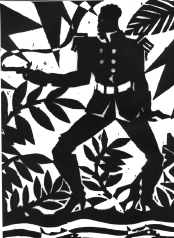YOU MUST
REMEMBER THIS
Joyce Carol Oates
(Dutton)
 The poop pix sent along with You Must Remember This shows Ms. Oates to be a lady with the clear and direct gaze of Tokyo Rose, the waspishness of Bonnie (as in Bonnie and Clyde), generally looking as warm and kissable as Rasputin's Uncle Igor. The writing clearly demonstrates the concerns of this modern-day Lady Macbeth: in the first fifty pages we have three attempted suicides, two rapes, an extensive description of the structure and aroma of an outhouse, exact prose descriptions of Bergen-Belsen and Buchenwald concentration camps, and
The poop pix sent along with You Must Remember This shows Ms. Oates to be a lady with the clear and direct gaze of Tokyo Rose, the waspishness of Bonnie (as in Bonnie and Clyde), generally looking as warm and kissable as Rasputin's Uncle Igor. The writing clearly demonstrates the concerns of this modern-day Lady Macbeth: in the first fifty pages we have three attempted suicides, two rapes, an extensive description of the structure and aroma of an outhouse, exact prose descriptions of Bergen-Belsen and Buchenwald concentration camps, and - a Negro boy maybe ten or eleven ... run over by a coal truck ... blood spilling out of his mouth, ears, like you'd squeeze paint out of a tube.
Good God, Carol --- don't you have some other obsessions with which to twiddle the hours away? It's like noodling about in the brain of the president of your local chapter of the Hell's Angels. Or better --- it's the night-to-night network television schedule put down on the printed page for those people who think they are too sophisticated to be watching the bloody reruns of "Miami Vice" or "Hawaii 5-0." It's no accident that Ms. Oates' favorite sport is boxing, which is, of course, no sport at all, but the chance to watch two poor bastards whaling the hell out of each other for a delusional title, which will make them punch-drunk, perhaps paralysed, by age forty.
TALK
The Words and Ways
of American Dialects
Robert Hendrickson
(Viking)
I have noticed the pronunciation of "0.K." being shortened to a more hurried "K" in the New York City area, and elsewhere; I noted this in Human Words and the pronunciation has become much more common since, though no dialectologist seems to have recorded it. Young people in particular often say "K" in place of "0.K.", and recently I have heard the expression pronounced even more quickly --- like the "k" in kitty.
Hendrickson is writing this for joy, and not to get kicked up the Ph.D. ladder or to stunt sophomores' (and readers') minds in the process. Words and phrases are included just for the hell of it --- because they are interesting, fun, even poetic:
Other interestingly named Southern dishes (for which no etymological explanations have been found) include "limping Susan" (rice and okra); "barefoot bread" (corn pone); "crawdads" (crawfish); "snickerdoodles" (cinnamon sugar cookies); "s'mores" (toasted marsh-
For some of us who grew up in the South, reading through his list of phrases brings back strong memories of nights settin' under the magnolia, swatting mosquito hawks on the front porch and fixin' to tell another tall 'un as we nibble on a mess of snickerdoodles:
"...get shed of" means to get rid of, "go to the bad" means to spoil, "gracious plenty" means more than enough, "a haint" is a ghost or apparition, "hisn and hern" can mean his and her, "like to" means almost ("I like to died"), "mash" means to press ("I'll mash the doorbell")...and "a mess" is a quantity of something.
John Sparks
Tony Soper
(Facts on File)
Sparks and Soper, the authors of Penguins, know too damn much about their subjects, and by the time you get to the end, you will too. The Indians of Tierra del Fuego dressed in a cloak of penguin skins. The heaviest penguin is the Emperor --- which weighs in at 100 pounds. The smallest is the Fairy Penguin, which shimmers like a cloud and carries a little silver wand under its left flipper and appears when you are feeling blue. The authors claim the term "penguin" comes from the Latin pinguis, which means "fat," but our favorite lingual etymologist W. W. Skeat says,
Selden (1613) derived it from Welsh pen gwyn, i.e., white head. In that case, it must first have been given to another bird, such as the auk (the puffin is common in Anglesey), since the penguin's head is black.
So much for Skeat --- the auk's head is black, too. In any event, we like the line "The puffin is common in Anglesey." It sounds like "The rain in Spain is mainly on the plain" or something out of Eliot, as in:
Where the breadfruit fall
And the penguin call
And the sound is the sound of the sea
Under the bam
Under the bam
Under the bamboo tree.
HARLEM
RENAISSANCE
Art of Black America
Edited by Charles Miers
(Abrams)
The surprises here are the stunning oils of William H. Johnson (especially his brilliant recreation of the crucifixion), Palmer Hayden's obvious bow to the French primitive Henri Rousseau, and the gouache and oils of Aaron Douglas, which seem to excel the works of his white contemporaries (Arthur Dove, Morgan Russell, Edward Hopper, Reginald Marsh).
The members of the Harlem Renaissance (self-deprecatingly called by themselves "the Niggerati") rose, shone briefly; then their world fell apart as Harlem fell apart in the economic catastrophe of the Depression.
TITANIC
The Life and
Death of a Legend
By Michael Davie
(Knopf)
It must have something to do with that cold clear night, the men disguised as women sneaking into the lifeboats, the Astors refusing to be separated, the band playing what they have always said, "Nearer My God to Thee" (not so --- it was "Autumn").
Anyway, it's pretty silly stuff, and Davie has a hard time breathing life into what was done with so much pizzazz by Walter Lord. The most interesting parts of this new assessment turn up near the end, with the recent discoveries of the gold diggers, and even more interesting, one Robert Ballard, who with the aid and assistance of the U.S. Navy (and our tax dollars) was able to send down a submersible bubble that descried wine bottles, porcelain dishes, bedsprings, and chamber pots there in the muck.
Then there's the complete text of the front- page story from the New York Times devoted to one Harold Bride, wireless operator, who said so poetically,
I felt I simply had to get away from the ship. She was a beautiful sight then ... she was gradually turning on her nose --- just like a duck does that goes down for a dive.
We have the actual transcript of the words of Mrs. J. Stuart White, showing herself to be a perfect Victorian lady at a perfect Victorian moment:
Before we cut loose from the ship they took out cigarettes and lighted them; on an occasion like that! ...
The man who rowed me took his oar and rowed all over the boat, in every direction. I said to him, "Why don't you put the oar in the oarlock?" He said, "Do you put it in that hole?" I said, "Certainly."
Those were the kind of men with whom we were put out to sea that night ... Where would we have been if it had not been for our women, with such men as that put in charge of the boat? Our head seaman would give an order and those men who knew nothing about the handling of a boat would say, "If you don't stop talking through that hole in your face there will be one less in the boat. "
We were in the hands of men of that kind. I settled two or three fights between them, and quietened them down. Imagine getting right out there and taking out a pipe and filling it and standing there smoking.
THE GNOSTIC
SCRIPTURES
Translated by Bently Layton
(Doubleday)
One of the translations of the word Ialdabaoth is "Satan" --- which implies the earth was created by you-know-who (and considering the dither that's been made of our foreign policy, that might not be too far off the mark).
Actually, the word is better translated as "Saklas" --- which is Aramaic for "fool" --- making our Yahweh more on the order of the Greek gods. He lusts for Eve, for example: "he became filled with lack of acquaintance" is the way it's phrased so delicately --- and, not being able to stand it any longer, rapes her right there on a toadstool in the Garden of Eden. "And to the present day sexual intercourse, which originated from the first ruler, has remained," they say --- getting rid of all this sin crap right off the bat.
The writing in The Gnostic Scriptures can be heavy going, but it can, as well, be fascinating for the lovely distortions it introduces into the tedious and familiar dogmas. For example, the source of all life is wisdom (Sophia), and she decides to spawn the god of us all, all by herself, described as "an afterthought ... an aeon:"
... she wished to do so without his pondering: for the person of her maleness did not join in the consent. Out of her was shown forth an imperfect product, that was different. And compared to the image of its mother it was misshapen, having a different form.
Her "desired artifact" --- Ialdabaoth, the creator of earth --- was
stamped differently --- serpentine, with a lion's face, and with its eyes gleaming like flashes of lightning. She cast it outside of her, outside that place, so that none of the immortals might see it: for she had made it without acquaintance. And she surrounded it with a luminous cloud. And she put a throne in the midst of the cloud, so that no being might see it except for the holy spirit called "mother of the living." And she called its name Ialdabaoth.
And now you know who created the god, and who created the world, and who created us --- and why it's all such a dratted mess.
--- R. R. Doister